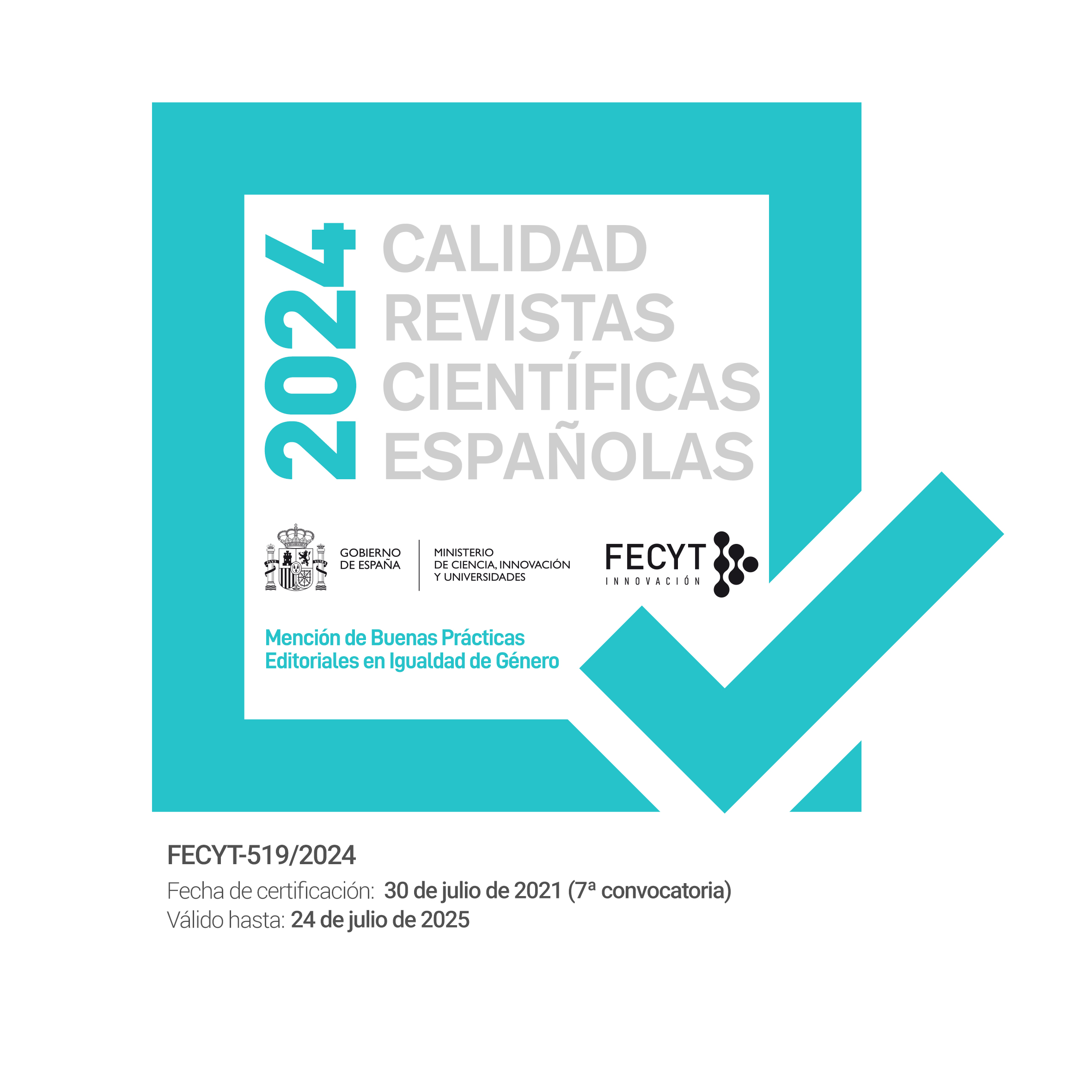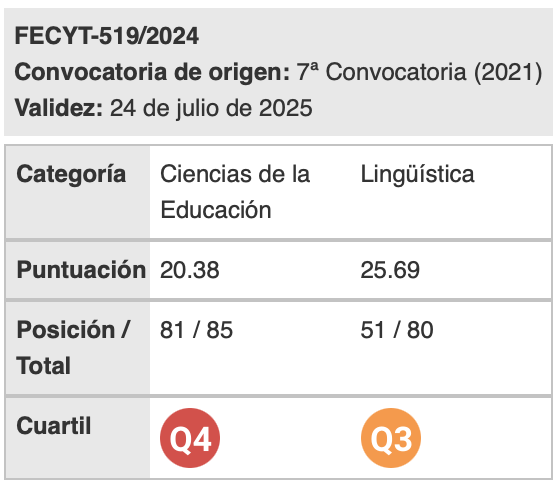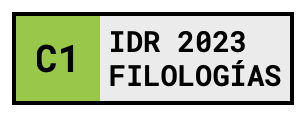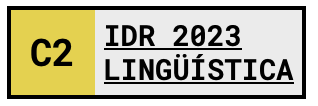Non-verbal markers of modality and evidentiality in MarENG
Palabras clave:
Maritime English, epistemic, deontic, evidential, attitudinal stanceResumen
This article examines a variety of options for expressing speaker and writer stance in a subcorpus of MarENG, a maritime English learning tool sponsored by the EU (35,041 words). Non-verbal markers related to key areas of modal expression are presented; (1)epistemic adverbs and adverbial expressions, (2) epistemic adjectives, (3) deontic adjectives, (4) evidential adverbs, (5) evidential adjectives, (6) evidential interpersonal markers, and (7) single adverbials conveying the speaker’s attitudes, feelings or value judgments. The overall aim is to present an overview of how these non-verbal markers operate in this LSP genre. An examination of the data show that in expressing stance, MarENG speakers and writers use three primary means: epistemic adjectives are more frequent than epistemic adverbs, the deontic adjectives necessary and essential, and centralized assessment adjectives combining with intensifiers, mainly with a positive axiology. They are also keen on more subtle and less subjective evaluative devices like adjectives pertaining to time, novelty, importance such as new or recent. Future research includes the study of verbal modality markers in MarENG.
Descargas
Citas
Alonso-Almeida, F. and Vázquez, N. (2009). Modality and stance in the Modern English section of the Corpus of Early English Recipes. In P. Cantos Gómez & A. Sánchez (Eds.), A survey on corpus-based research / Panorama de investigaciones basadas en corpus (pp. 1171-1179). Murcia: EDITUM .
Alonso-Almeida, F. and Vázquez, N. (2010). Modal verbs in early Modern English recipes. In A. Sánchez & M. Almela (Eds.), A mosaic of corpus linguistics. Selected approaches. (pp. 237-247). Studien zur romanischen Sprachwissenschaft und interkulturellen Kommunikation, 66. Frankfurt am Main: Peter Lang.
Biber, D. and Finegan, E. (1986). Styles of stance in English: Lexical and grammatical marking of evidentiality and affect. Text (9), 93-124.
Biber, D. et al. (1999). Longman Grammar of Spoken and Written English. London: Longman.
Carretero, M. (2002). The influence of genre and register on epistemic modality in spoken English: a preliminary study. Estudios Ingleses de la Universidad Complu- tense (10), 11-41.
Chafe, W. and Nichols J. eds. (1986). Evidentiality: The Linguistic Coding of Epistemology, Norwood, NJ: Ablex.
Conrad, S. and Biber D. (1999). Adverbial marking of stance in speech and writing. In S. Hunston & G. Thompson (Eds.) Evaluation in Text: Authorial Stance and the Construction of Discourse. (pp. 56-73). Oxford: OUP,
Downing, A. (2006). Discourse Markers, Pragmatic Markers, Stance Markers. In J. Salazar, M. Amengual & M. Juan (Eds.), A survey in Usos sociales del lenguaje y aspectos psicolingüísticos: perspectivas aplicadas. (pp. 59- 76). Illes Balears: Universitat de les Illes Balears.
Fairclough, N. (2003). Analysing Discourse. Textual Analysis for Social Research.
London: Routledge.
Halliday, M.A.K. (1994). An Introduction to Functional Grammar (Second Edition). London: Edward Arnold.
Halliday, M.A.K. and Matthiessen, C.M.I.M. (2004). An Introduction to Functional Grammar. 3rd ed. London: Arnold.
Hoye, L. (1997). Adverbs and Modality in English. London: Longman.
Hyland, K. (1998a). Persuasion and context: The pragmatics of academic
metadiscourse. October 1998, 437-455.
Hyland, K. (1998b). Hedging in Scientific Research Articles. Amsterdam: Benjamins.
Hyland, K. (2000). Disciplinary Discourses: Social Interactions in Academic Writing. London: Longman.
Hunston, S. and Thompson G. eds. (2000). Evaluation in Text: Authorial Stance and the Construction of Discourse. Oxford: Oxford University Press.
Kiefer, F.C. (2009). On defining Modality. Folia Linguistica. Volume 21, Issue 1, 67-94.
Leech, G. (2003). Modality on the move. In R.Facchinetti , G. Manfred, R.M Krug & F.R. Palmer (Eds.), Modality in contemporary English (pp. 223-240). Berlin: Mouton.
Mauranen, A. (2001). Reflexive academic talk: Observations from MICASE. In R. C. Simpson & J. M. Swales (Eds.), Corpus Linguistics in North America: Selections from the 1999 symposium (pp. 165-178). Ann Arbor: University of Michigan Press.
Marín-Arrese, J. (2004). Evidential and epistemic qualifications in the discourse of fact and opinion: a comparable corpus study”. In Juana Marín Arrese (Ed.), Perspectives on Evidentiality and Modality (pp. 153-184). Madrid: Editorial Complutense.
Martin, J.R. (2000). Beyond exchange: APPRAISAL systems in English. In Hunston & Thompson (Eds.), Evaluation in Text: Authorial Stance and the Construction of Discourse. (pp. 142-175). Oxford: Oxford University Press.
Nuyts, J. (1993). Epistemic modal adverbs and adjectives and the layered representation of conceptual and linguistic structure”. Linguistics 31, 933-969.
Palmer, F. R. (1986/2001). Mood and modality. Cambridge: Cambridge University Press, 2nd edition.
Papafragou, A. (2006). Epistemic modality and truth conditions Lingua 116, 1688–1702.
Piqué-Angordans, J. , Posteguillo, S. and Andreu-Besó, J.V. (2002). Epistemic and deontic modality: a linguistic indicator of disciplinary variation in academic English. LSP & Professional Communication, vol (2), 2, 49-64.
Plungian, V. (2001). The place of evidentiality within the universal grammatical space. Journal of Pragmatics, (33), 349-357.
Preacher, K. J. (2001, April). Calculation for the chi-square test: An interactive calculation tool for chi-square tests of goodness of fit and independence [Computer software]. Available from.
Rezzano, N. S. (2004). Modality and Modal Responsibility in Research Articles in English”. In R. Facchinetti & F. Palmer (Eds.), English Modality in Perspective. (pp. 101-118). Frankfurt am Main: Peter Lang.
Samson, C. (2006) ‘... is different from ...’ A corpus-based study of evaluative adjectives in economics discourse, IEEE Transactions on Professional Commu- nication 49, (3), 236-245.
Simon-Vandenbergen, AM and Aijmer, K. (2007). Functionality of adjectival and adverbial epistemic expressions. In C. Butler, H. T. Downing, J. Lavid & A. Downing (Eds.), Functional perspectives on grammar and discourse. (pp. 419-445). Amsterdam: John Benjamins.
Swales J. and Burke A. (2003). It’s Really Fascinating Work: Differences in Evaluative Adjectives Across Academic Registers. In C. Meyer, (Ed.), Proceedings of The Third Corpus Linguistics Symposium (pp. 1-19). Amsterdam: Rodopi.
Swales, J. (2006). Corpus Linguistics and English for Academic Purposes. In E. Arnó, A. Soler & C. Rueda, (Eds.), Information Technology in Languages for Specific Purposes. (pp. 19-34). New York: Springer.
Descargas
Publicado
Cómo citar
Número
Sección
Licencia
Aquellos autores/as que tengan publicaciones con esta revista, aceptan los términos siguientes:
- Los autores/as conservarán sus derechos de autor y garantizarán a la revista el derecho de primera publicación de su obra, el cuál estará simultáneamente sujeto a la Licencia de reconocimiento de Creative Commons que permite a terceros compartir la obra siempre que se indique su autor y su primera publicación esta revista.
- Los autores/as podrán adoptar otros acuerdos de licencia no exclusiva de distribución de la versión de la obra publicada (p. ej.: depositarla en un archivo telemático institucional o publicarla en un volumen monográfico) siempre que se indique la publicación inicial en esta revista.
- Se permite y recomienda a los autores/as difundir su obra a través de Internet (p. ej.: en archivos telemáticos institucionales o en su página web) antes y durante el proceso de envío, lo cual puede producir intercambios interesantes y aumentar las citas de la obra publicada. (Véase El efecto del acceso abierto).

Revista de Lenguas para fines específicos is licensed under a Creative Commons Reconocimiento-NoComercial-SinObraDerivada 4.0 Internacional License.






















